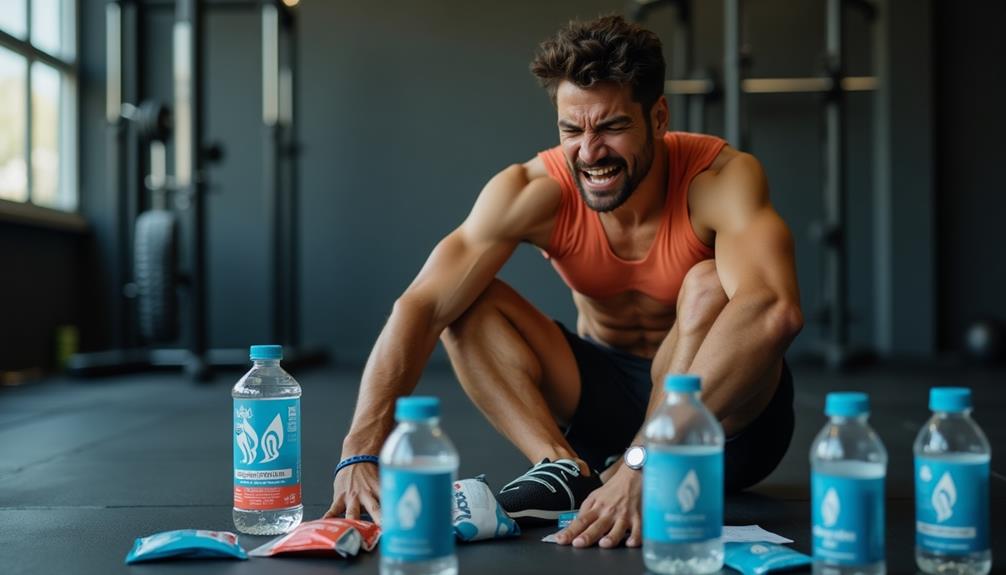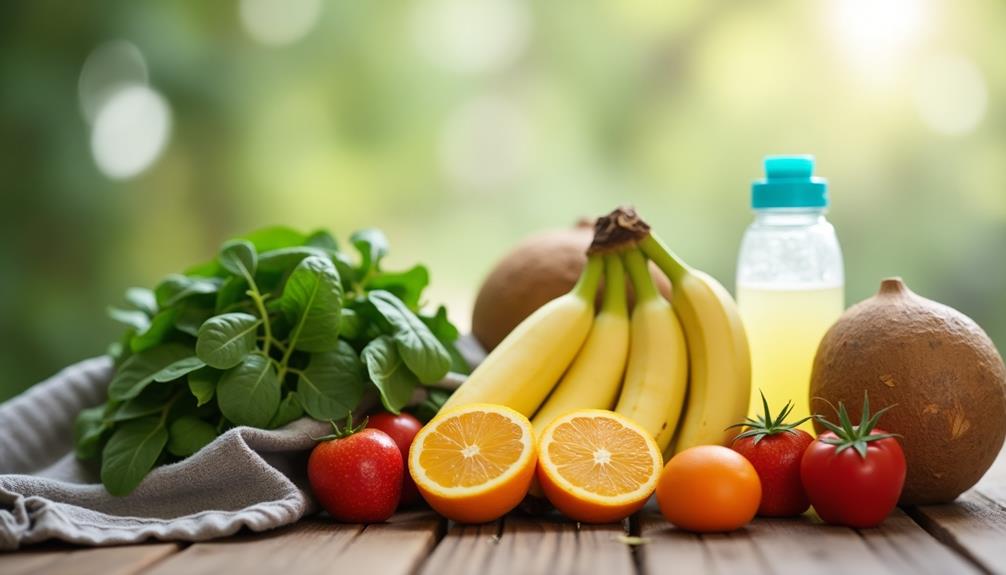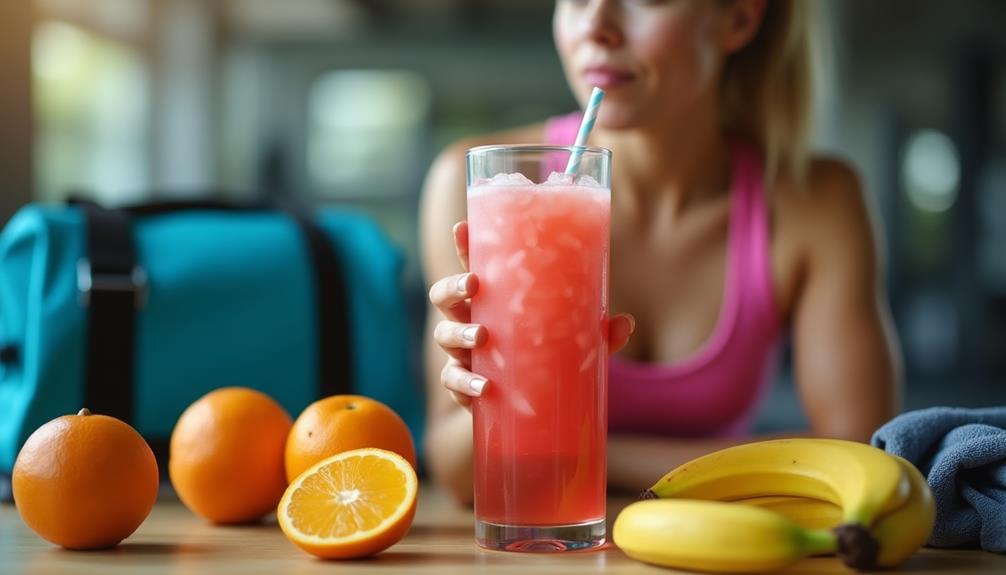Replenishing electrolytes after a workout is essential for recovery and performance. You lose key minerals like sodium, potassium, and magnesium through sweat. Replacing these helps prevent muscle cramps and fatigue, while also supporting hydration and nutrient transport. Key electrolytes like sodium aid fluid balance, while potassium is fundamental for muscle function. If you don't replenish, you might experience symptoms like irregular heartbeat and nausea. Enjoy coconut water, fruits, or electrolyte drinks for an effective recovery. Balancing your electrolytes is necessary for ongoing energy and focus. There's plenty more to uncover about maintaining these levels efficiently.
Core Insights
- Electrolytes like sodium and potassium lost in sweat are essential for recovery and optimal performance after exercise.
- Replenishing electrolytes helps prevent muscle cramps, fatigue, and dehydration, promoting faster recovery.
- Proper electrolyte balance supports hydration, nutrient transport, and waste removal in the body.
- Symptoms of deficiency, such as irregular heartbeat and nausea, highlight the importance of monitoring electrolyte intake post-workout.
- Effective sources for replenishing electrolytes include coconut water, electrolyte drinks, fruits, and pickle juice.
What Are Electrolytes?

Understanding what electrolytes are is crucial for anyone engaged in physical activity. Electrolytes are minerals in your body that carry an electric charge. They include sodium, potassium, calcium, magnesium, chloride, bicarbonate, and phosphate. These minerals play a significant role in maintaining fluid balance, muscle function, and nerve signaling. Coconut water brands are often rich in electrolytes, particularly potassium, making them popular choices for post-workout hydration. Many athletes and fitness enthusiasts prefer natural sources of electrolytes over synthetic sports drinks.
When you exercise, you lose electrolytes through sweat. This loss can lead to muscle cramps, fatigue, or dehydration if not replenished. Each electrolyte has a specific function. For example, sodium helps regulate blood pressure, while potassium supports muscle contractions.
Why Electrolytes Matter After Exercise

After an intense workout, replenishing electrolytes is essential for recovery and overall performance. Electrolytes, such as sodium, potassium, and magnesium, play a pivotal role in maintaining fluid balance, muscle function, and nerve signaling. When you exercise, you lose these crucial minerals through sweat, which can lead to dehydration and muscle cramps. If you don't replace them, you might feel fatigued or sluggish during your next workout. One excellent way to replenish electrolytes is by consuming coconut water brands, which are naturally rich in potassium and other essential minerals. Additionally, proper electrolyte balance helps to support your immune system and aids in recovery, allowing your body to bounce back faster. By focusing on replenishing electrolytes post-workout, you'll set yourself up for better performance in future sessions, keeping your energy levels high and your body functioning optimally.
Key Electrolytes for Recovery

Sodium helps retain fluid balance and supports nerve function. After sweating, it's essential to replace lost sodium to prevent dehydration. Many athletes turn to electrolyte gummies for convenient post-workout replenishment.
Potassium plays a key role in muscle function and can help reduce cramps. Including potassium-rich foods like bananas can aid in recovery.
Calcium supports muscle contractions and bone health.
Lastly, magnesium helps with muscle relaxation and energy production.
Symptoms of Electrolyte Deficiency

Additionally, you could experience an irregular heartbeat, which is a serious concern and should prompt immediate attention. Nausea and vomiting can also arise, further complicating your recovery. If you encounter these symptoms, evaluating your electrolyte intake is crucial. Staying aware of these warning signs can help you maintain your overall health and performance.
Benefits of Replenishing Electrolytes

Replenishing electrolytes after a workout can greatly enhance your recovery and performance. When you exercise, your body loses essential minerals like sodium, potassium, and magnesium through sweat. Replenishing these electrolytes helps restore balance, which is crucial for muscle function.
By replacing lost electrolytes, you'll reduce muscle cramps and fatigue, enabling you to perform better in your next workout. Proper electrolyte levels also support hydration, ensuring your cells function efficiently. This aids in nutrient transport and waste removal, speeding up recovery.
Moreover, maintaining electrolyte balance can improve your focus and energy levels, keeping you sharp and ready for the tasks ahead. In short, replenishing electrolytes post-workout is necessary for overall health and performance enhancement.
Best Sources of Post Workout Electrolytes

When it comes to replenishing electrolytes after a workout, there are several excellent sources to contemplate. Incorporating these into your post-exercise routine can help restore balance and enhance recovery. Here are some top picks:
- Coconut water: This natural drink is rich in potassium and low in calories.
- Electrolyte drinks: Look for those with low sugar and balanced electrolytes to hydrate effectively.
- Fruits: Bananas, oranges, and watermelon are great for boosting potassium and hydration.
- Pickle juice: Though unconventional, it's packed with sodium and can quickly replenish lost electrolytes.
How to Properly Hydrate

Hydration plays an essential role in your overall recovery after a workout. To hydrate properly, start by drinking water immediately after you finish exercising. Aim for about 16 to 24 ounces to replenish what you've lost through sweat.
Consider adding electrolytes to your hydration routine, especially if your workout was intense. These minerals help balance fluids in your body and can speed up recovery.
Listen to your body; if you feel thirsty, don't ignore it. Thirst is a signal that your body needs more fluids.
Keep a water bottle handy throughout the day to encourage consistent hydration. Remember, proper hydration supports muscle recovery, reduces fatigue, and helps maintain overall performance. Prioritize it, and your body will thank you!
Timing Your Electrolyte Intake

- Immediately Post-Workout: Your muscles are primed to absorb nutrients.
- Within 30 Minutes: This window is essential for effective recovery.
- During Intense Training Sessions: Keep your energy levels stable.
- Throughout the Day: Maintain hydration and electrolyte balance.
Electrolytes and Athletic Performance

Electrolytes play an essential role in enhancing athletic performance, acting as the body's chemical messengers that help regulate muscle function and maintain fluid balance. When you sweat during exercise, you lose these essential minerals, which can lead to fatigue, cramps, and decreased performance.
Sodium, potassium, calcium, and magnesium are key electrolytes that support muscle contractions and nerve impulses. Maintaining proper levels of these minerals guarantees your muscles function at their best, allowing for better endurance and strength during workouts.
Common Myths About Electrolytes

Many people believe that consuming electrolytes is only necessary for elite athletes or those engaging in intense workouts. This is simply not true. Here are some common myths you might encounter:
- Only athletes need electrolytes.
- Water is enough for hydration.
- Electrolyte drinks are only for after workouts.
- You can't get electrolytes from food.
In reality, everyone can benefit from electrolytes, especially if you're sweating, feeling fatigued, or experiencing muscle cramps. They help maintain proper fluid balance and support nerve and muscle function. Whether you're exercising moderately or just going about your day, ensuring your electrolyte levels are balanced is essential for overall well-being. Don't underestimate their importance!
Frequently Asked Questions
Can I Get Enough Electrolytes From Food Alone?
Yes, you can get enough electrolytes from food alone. Incorporate fruits, vegetables, nuts, and dairy into your diet. Just make sure you're eating a balanced variety to meet your body's electrolyte needs effectively.
Are Electrolyte Supplements Safe for Everyone?
You can't judge a book by its cover, and the same goes for electrolyte supplements. They're generally safe for most, but it's wise to consult your doctor, especially if you have underlying health issues.
How Do Weather Conditions Affect Electrolyte Needs?
Weather conditions impact your electrolyte needs greatly. In hot, humid climates, you sweat more, losing salts faster. Cold weather can also increase your need due to dehydration. Adjust your intake based on the conditions you face.
Can Excessive Electrolytes Be Harmful?
Yes, excessive electrolytes can be harmful, but too few can lead to issues too. You need balance; too much sodium or potassium can cause heart problems, while inadequate levels might leave you fatigued and cramping.
Do Different Sports Require Different Electrolyte Strategies?
Yes, different sports do require different electrolyte strategies. For instance, endurance athletes need higher sodium due to prolonged sweating, while strength athletes may focus more on potassium and magnesium for muscle function and recovery.

